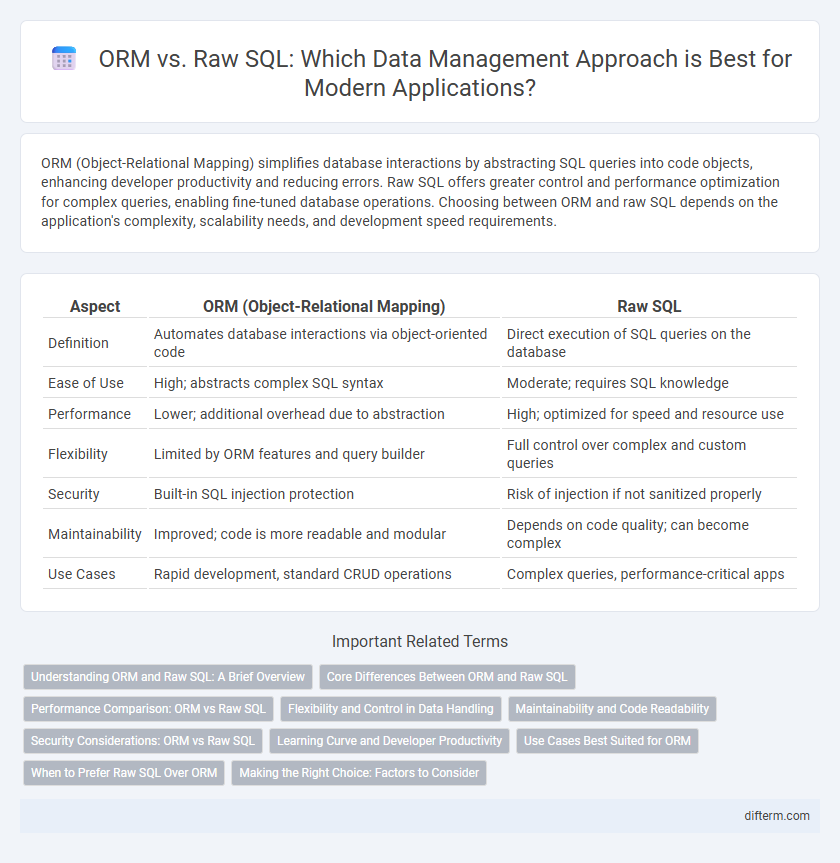ORM (Object-Relational Mapping) simplifies database interactions by abstracting SQL queries into code objects, enhancing developer productivity and reducing errors. Raw SQL offers greater control and performance optimization for complex queries, enabling fine-tuned database operations. Choosing between ORM and raw SQL depends on the application's complexity, scalability needs, and development speed requirements.
Table of Comparison
| Aspect | ORM (Object-Relational Mapping) | Raw SQL |
|---|---|---|
| Definition | Automates database interactions via object-oriented code | Direct execution of SQL queries on the database |
| Ease of Use | High; abstracts complex SQL syntax | Moderate; requires SQL knowledge |
| Performance | Lower; additional overhead due to abstraction | High; optimized for speed and resource use |
| Flexibility | Limited by ORM features and query builder | Full control over complex and custom queries |
| Security | Built-in SQL injection protection | Risk of injection if not sanitized properly |
| Maintainability | Improved; code is more readable and modular | Depends on code quality; can become complex |
| Use Cases | Rapid development, standard CRUD operations | Complex queries, performance-critical apps |
Understanding ORM and Raw SQL: A Brief Overview
Object-Relational Mapping (ORM) tools automate database interactions by converting data between incompatible systems using an object-oriented paradigm, streamlining development and reducing boilerplate code. Raw SQL involves writing direct Structured Query Language commands, offering fine-grained control and optimization opportunities for complex queries. Understanding the trade-offs between ORM abstractions and Raw SQL precision is crucial for optimizing database performance and maintainability in modern applications.
Core Differences Between ORM and Raw SQL
ORM (Object-Relational Mapping) abstracts database interactions by converting data between incompatible type systems using objects, enhancing developer productivity through automated query generation and model management. Raw SQL provides direct control over database queries, offering greater flexibility and performance optimization by allowing complex, customized commands tailored to specific database engines. The core difference lies in ORM's ease of use and maintainability versus Raw SQL's fine-grained control and efficiency in complex query execution.
Performance Comparison: ORM vs Raw SQL
Raw SQL queries typically deliver faster performance than Object-Relational Mapping (ORM) frameworks because they allow direct database interactions without abstraction layers. ORMs introduce overhead by converting objects to SQL commands and managing relationships, which can slow down complex query execution and large data operations. Optimizing performance with ORM often requires query tuning and understanding its generated SQL, whereas raw SQL gives developers full control for maximum efficiency in database operations.
Flexibility and Control in Data Handling
ORM (Object-Relational Mapping) provides abstraction that simplifies data handling but can limit flexibility due to predefined query structures and automatic optimizations. Raw SQL offers granular control over database interactions, allowing complex, highly customized queries that optimize performance for specific use cases. Developers prioritize Raw SQL when precise data manipulation, transaction control, and query optimization are critical to application requirements.
Maintainability and Code Readability
Object-Relational Mapping (ORM) enhances maintainability and code readability by abstracting complex SQL queries into intuitive, language-specific objects, reducing boilerplate code and minimizing errors. Raw SQL provides fine-grained control and performance optimization but often results in verbose, less readable code that can be harder to maintain and debug. Developers prioritize ORM in large-scale projects for clearer, modular code structure that accelerates development and simplifies future updates.
Security Considerations: ORM vs Raw SQL
Object-Relational Mapping (ORM) frameworks provide built-in protection against SQL injection attacks by using parameterized queries and abstracting raw database queries. Raw SQL, while offering greater control and flexibility, poses higher security risks if input sanitization and parameterization are not rigorously enforced by developers. Choosing ORM enhances security posture by minimizing direct interaction with the SQL layer, reducing vulnerability exposure in application databases.
Learning Curve and Developer Productivity
ORMs offer a gentler learning curve for developers by abstracting complex SQL queries into more intuitive code, enabling faster project onboarding and reducing syntax errors. Raw SQL demands a deeper understanding of database structures and query languages, often increasing initial development time but providing greater control and optimization opportunities. Using ORM typically boosts developer productivity through reusable components and automated query generation, while raw SQL grants fine-grained optimization at the cost of steeper learning and manual maintenance.
Use Cases Best Suited for ORM
Object-Relational Mapping (ORM) is best suited for applications requiring rapid development, complex data models, and maintainable codebases by abstracting database queries into object-oriented code. It simplifies data interactions in projects with frequent schema changes, enabling developers to avoid writing repetitive raw SQL and reducing the risk of SQL injection vulnerabilities. ORM frameworks excel in managing relationships and transactions in enterprise applications, content management systems, and software with dynamic querying needs.
When to Prefer Raw SQL Over ORM
Raw SQL should be preferred over ORM when complex queries require fine-tuned performance optimizations that ORMs cannot efficiently handle. Scenarios involving intricate joins, custom database functions, or large data volume operations benefit from raw SQL's direct execution and precise control. Developers also choose raw SQL for advanced database-specific features or when ORM abstractions introduce unnecessary overhead and latency.
Making the Right Choice: Factors to Consider
Choosing between ORM and raw SQL depends on factors such as development speed, application complexity, and database portability requirements. ORM provides abstraction that accelerates coding and reduces syntax errors, making it ideal for complex applications with frequent schema changes. Raw SQL offers maximum control and performance optimization, which is crucial for queries requiring fine-tuned execution and when database-specific features are needed.
ORM vs Raw SQL Infographic

 difterm.com
difterm.com